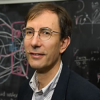Dimitar Sasselov

Dimitar Sasselov
Dimitar D. Sasselovis a Bulgarian astronomer based in the United States. He is a Professor of Astronomy at Harvard University and director of the Harvard Origins of Life Initiative. In 2002, Sasselov led a team that discovered the most distant planet in the Milky Way known at the time...
NationalityBulgarian
ProfessionScientist
CountryBulgaria
call environment isolated keeping life molecules necessary phenomenon
When we think of what is necessary for the phenomenon that we call life, we think of compartmentalization, keeping the molecules which are important for life in a membrane, isolated from the rest of the environment, but yet, in an environment in which they actually could originate together.
home love planet
We love our planet Earth. We should - it is our home, and there's no place like home. There can't ever be a better place than Earth.
ask based depend expect life local question starting universal
The question we ask is - if there is life on other planets, should we expect it to be based on the same molecules, i.e. be universal - or should we expect it to depend on the local conditions, i.e. on the planet's geochemistry. So to find out, we try experiments on biomolecules, starting with such geochemistry conditions.
earth life places powerful
There is immense, powerful potential in life in this universe - especially now that we know that places like the Earth are common. And that potential, that powerful potential, is also our potential, of you and me.
again call center discover front home planet question reminding
When we discover New Earth - a planet we could call home - the question of the 'plurality of worlds' will come front and center, reminding us yet again that we are not the center of the universe.
conditions extremely hard initial large life requires resilient rich seem solar system takes
Life is extremely resilient once it takes hold, but it requires rich chemistry, large energy sources, and stability, right from the beginning. The comparative planetology of our solar system makes it seem like those initial conditions are hard to come by.
children parent compare
Life and the universe compare to each other like a child and a parent, parent and offspring.
discovery looks exploration
It feels great to discover a planet, just like any discovery in science, except that it has more of the feel of exploration - you can go back and look at it. However, I can never visit.
lifetime
In science, it is rare that a transformational change occurs during our lifetimes.
stars dark marine
I grew up in Bulgaria in a small city on the Black Sea Coast, so I was very interested in the sea, marine life, and everything related to it. But it was also a very dark place at night, so I could see the stars. And I just got very interested in it.
rocks water needs
We do care about planets like the Earth because by now we understood that life as a chemical system really needs a smaller planet with water and with rocks and with a lot of complex chemistry to originate, to emerge, to survive.
home world earth
When we discover New Earth - a planet we could call home - the question of the plurality of worlds will come front and center, reminding us yet again that we are not the center of the universe.
parent telescopes hobbies
My parents gave me a small telescope, then I built my own, and one thing led to another. So thats how I ended up going from being a hobby astronomer to a professional astronomer.
common easily form larger mass might planets retain surface thanks true
Ocean planets might be very common in the universe because water is very common in the low-temperature environments where planets form and evolve. This might be especially true for super-Earths, which can retain volatiles more easily thanks to their larger mass and surface gravity.